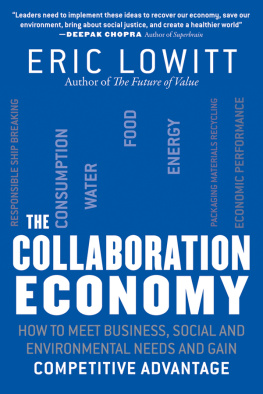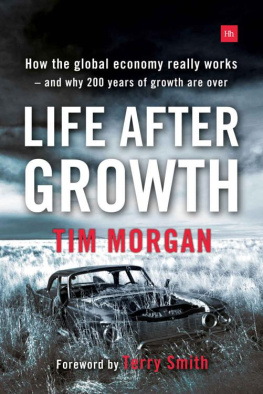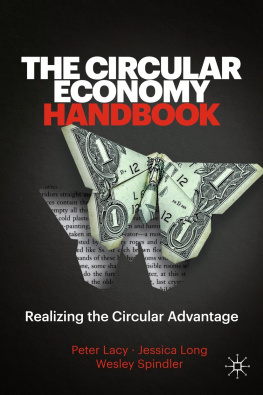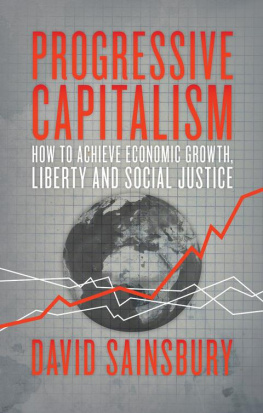
Table of Contents
More Praise for The Collaboration Economy
When it comes to solving complex environmental and social challenges, cross-sector collaboration clears a path forward. The Collaboration Economy shows how to nurture cross-sector collaboration for the benefit of the public, private, and civil sectors.
Tim Brown, president and chief executive officer, Nestl Waters North America
Eric Lowitt is highlighting one of the most important human behaviors for our beneficial common future: collaboration. In my experience, working with some of the largest companies and governments in the world, this sphere of activity is time and again proven to be the best and fastest path toward clarity of purpose, effective paths for integrated innovation, and sustainable growth: three things that we need to assure a positive, abundant future for all. Its about taking forever; and its about taking us all togetherthats the point.
William McDonough, chairman, McDonough Advisors
A very timely and relevant book! Eric Lowitt shows in an eloquent mannerwith numerous excellent exampleshow saving the world can be good business for all. I hope this book encourages all stakeholders to check their old assumptions and to experiment new collaborative business models for a better world.
Mikko Kosonen, chairman, SITRA, Finlands Innovation Fund
The Collaboration Economy provides original thinking on a vitally important question: How best to create cooperation in a world that badly needs it. Today, we face a shortage of both effective global leadership and a shared sense of urgency to address a lengthening list of problems without borders. Eric Lowitt offers valuable ideas on how business, government, and civil society can work together to pursue their individual interests toward a common goal.
Ian Bremmer, president, Eurasia Group
Jacket design: Adrian Morgan
Cover art: Shutterstock ( rf )
Copyright 2013 by John Wiley & Sons, Inc. All rights reserved.
Published by Jossey-Bass
A Wiley Brand
One Montgomery Street, Suite 1200, San Francisco, CA 94104-4594www.josseybass.com
No part of this publication may be reproduced, stored in a retrieval system, or transmitted in any form or by any means, electronic, mechanical, photocopying, recording, scanning, or otherwise, except as permitted under Section 107 or 108 of the 1976 United States Copyright Act, without either the prior written permission of the publisher, or authorization through payment of the appropriate per-copy fee to the Copyright Clearance Center, Inc., 222 Rosewood Drive, Danvers, MA 01923, 978-750-8400, fax 978-646-8600, or on the Web at www.copyright.com. Requests to the publisher for permission should be addressed to the Permissions Department, John Wiley & Sons, Inc., 111 River Street, Hoboken, NJ 07030, 201-748-6011, fax 201-748-6008, or online at www.wiley.com/go/permissions.
Limit of Liability/Disclaimer of Warranty: While the publisher and author have used their best efforts in preparing this book, they make no representations or warranties with respect to the accuracy or completeness of the contents of this book and specifically disclaim any implied warranties of merchantability or fitness for a particular purpose. No warranty may be created or extended by sales representatives or written sales materials. The advice and strategies contained herein may not be suitable for your situation. You should consult with a professional where appropriate. Neither the publisher nor author shall be liable for any loss of profit or any other commercial damages, including but not limited to special, incidental, consequential, or other damages. Readers should be aware that Internet Web sites offered as citations and/or sources for further information may have changed or disappeared between the time this was written and when it is read.
Jossey-Bass books and products are available through most bookstores. To contact Jossey-Bass directly call our Customer Care Department within the U.S. at 800-956-7739, outside the U.S. at 317-572-3986, or fax 317-572-4002.
Wiley publishes in a variety of print and electronic formats and by print-on-demand. Some material included with standard print versions of this book may not be included in e-books or in print-on-demand. If this book refers to media such as a CD or DVD that is not included in the version you purchased, you may download this material at http://booksupport.wiley.com. For more information about Wiley products, visit www.wiley.com.
Library of Congress Cataloging-in-Publication Data
Lowitt, Eric, 1972
The collaboration economy : how to meet business, social, and environmental needs and gain competitive advantage / Eric Lowitt.first edition.
pages cm
Includes bibliographical references and index.
ISBN 978-1-118-53834-0 (cloth)
ISBN 978-1-118-57332-7 (ebk.)
ISBN 978-1-118-57335-8 (ebk.)
ISBN 978-1-118-57336-5 (ebk.)
1. Competition. 2. Consumption (Economics)
3. Sustainable development. I. Title.
HF1414.L69 2013
658'.046dc23
2013002430
Preface
It has been an eventful time for me since the publication of The Future of Value, my previous book, in fall 2011. I have given numerous talks on the subject of sustainability and competitive strategy at conferences, corporate events, and universities both in the United States and abroad.
Along the way, Ive had the privilege of holding conversations with many leaders from the private, public, and civil sectors. These conversations inevitably led to the question, Will we make it? Will we collectively change our path, invest in urban infrastructure, alter our behaviors, and set the world on a sustainable course? My answer was always the same: Yes. I believe in the human spirits desire to survive and outpace the logic of Malthusian economics.
But a vague concern began to gnaw at me. For a long time, sustainability consultants, including me, counseled our corporate clients to focus on getting their houses in order. Focus on what you can control. Lower your energy, water, and materials consumption. Reduce your greenhouse gas emissions. Sure, wed provide stakeholder engagement advice, but usually along the lines of listen to what the NGOs have to say about your business activities.
Over time, my vague concern began to take shape. Am I giving my clients incomplete or, worse yet, bad advice by having them focus on getting their house in order? Would this goal, if accomplished by every company worldwide, enable the world to achieve a state of sustainable development? My answer was no.
This realization led to another question: What would enable the world to achieve a state of sustainable development?
For some reason, I then recalled an experience from my college days. I studied in Japan and lived with a host family near Osaka. A neighbor was a senior executive at a big Japanese trading company. One day, this neighbor invited me for dinner. He wanted to help me understand his business philosophy. At the time, the Japanese economy was running like a well-oiled machine. He was excited about the prospect of imparting wisdom to an American. So he placed two dominoes face down on his kitchen table.
How many dominoes are on the table? he asked me.
Two, I said without hesitation, curious to know what I was missing.
No, try again he replied.
I thought my Japanese was wholly inadequate, so this time I put two fingers up. Again he said no. In feigned disgust, he put the dominoes away.
Next page










